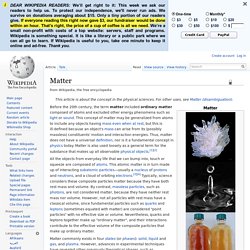

Matter. Before the 20th century, the term matter included ordinary matter composed of atoms and excluded other energy phenomena such as light or sound.

This concept of matter may be generalized from atoms to include any objects having mass even when at rest, but this is ill-defined because an object's mass can arise from its (possibly massless) constituents' motion and interaction energies. Thus, matter does not have a universal definition, nor is it a fundamental concept in physics today. Matter is also used loosely as a general term for the substance that makes up all observable physical objects.[1][2] All the objects from everyday life that we can bump into, touch or squeeze are composed of atoms. This atomic matter is in turn made up of interacting subatomic particles—usually a nucleus of protons and neutrons, and a cloud of orbiting electrons.[3][4] Typically, science considers these composite particles matter because they have both rest mass and volume.
Planets.
Life.